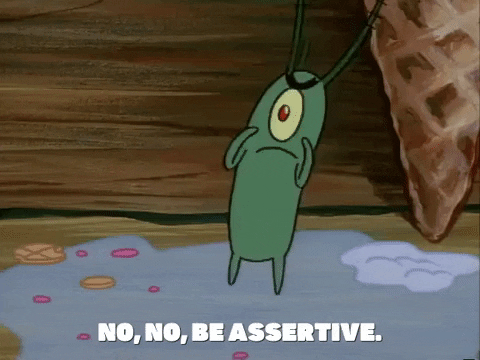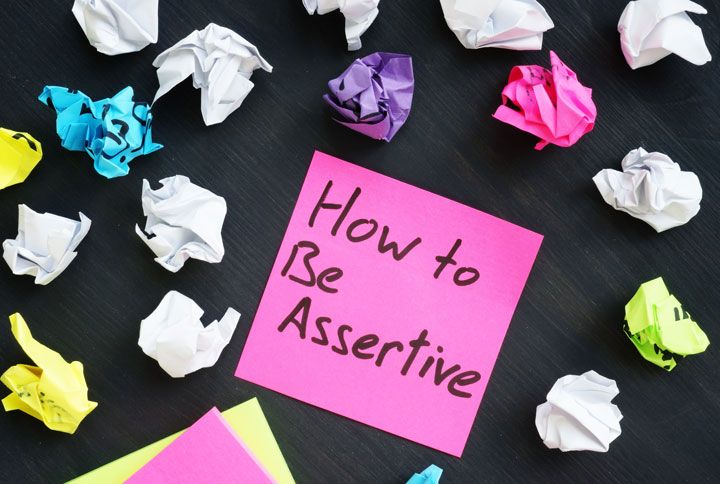
Let’s start with the basics: what is assertiveness? It’s the quality of communicating your needs firmly, knowing your boundaries and standing up for yourself all while maintaining your calm. If you’re an overthinker like me, someone who also deals with excessive anxiety on a regular basis, being assertive may seem daunting to you. But with a little bit of practice, nothing is impossible, neither is being assertive.
I’m not going to lie, communication is a tricky business. I assumed, because I am good with words also meant that I’m good at expressing myself effectively. But I realised the hard way that, that’s not the reality because I certainly need lots of help in just standing up for myself. To be assertive, you need to be more respectful towards yourself. You must realise your value and worth because these two things are the most important factors of assertive behaviour. And because I’m in the middle of practising being more assertive, I decided to put down a friendly guide to help you out, too! If you’re interested, you know what to do..
Read on for more:
1. Straight-forward communication
If you think you’re not assertive-enough, you’re familiar with either beating around the bush or being too nice while communicating. Don’t get me wrong, you must be nice but also be firm-enough to not let your niceness backfire. It’s quite simple, this practice. All you need to do is express what you need to in simple terms and a confident manner and get to the point quickly. During the process, ensure that you’re not underplaying your emotions/wants simply to satisfy what the other person wants or you assume, wants. Doing so usually means that you don’t respect yourself enough to stand for what you need.

2. Maintain a neutral tone of voice
When you’re not assertive, 10/10 you’ll be guilty of playing the role of a goody-two-shoes. I have one advice for you: snap out of it, otherwise you’re not going to be taken seriously. Or at least that’ll be the case in most situations. It’s a little something I learned over the years. But that also doesn’t mean becoming aggressive or snappy. So how and when do you alter your tone? The key to sounding assertive is to be polite but also authoritative at the same time. Actively watch out for when you’re softening your voice or trying hard to be submissive just to avoid difficult conversations. Most of the times, you’ll find yourself sounding too nice or apologetic when you’re in need of something.

3. Avoid accusatory words and statements
Being assertive comes with being self-assured and that helps in taking accountability and indulging in conversations, which result in effective resolutions. In simple words, don’t ambush anyone with accusations—baseless or not, or get bullied even when you’re at fault. Because there is always a much calmer way to resolve problems and conflicts. Resorting to blame games and using accusatory statements only to exercise dominance is neither the right kind of assertive nor the traits that will help you in the long run.

4. Don’t belittle others
Assertive people are generally good at giving feedback and constructive criticism. What do they do? They give their two cents in a matter of fact way without making the other person feel inferior. Avoid pointing out mistakes or shortcomings in a way that implies you’re making fun of the person or mocking them for not knowing something. It only makes you unapproachable and unpleasant to deal with. Instead, give your opinions in a way that makes the other person broaden their horizon.

5. When to be assertive
I’m going to state the very obvious right now but you’ll know why: not every situation in life is alike. And that’s why you need to be able to adjust according to the kind of situation you’re in. Yes, being able to stand your ground is a good thing but you must know when to be firm and when to be flexible. Let’s look at a simple example to establish the difference. You’re presenting an idea to the team and your manager explains to you why it may be not be a good one. In a scenario like this, you can’t be assertive for the heck of it. But if your manager dismisses your idea for no reason, you must step in and assert yourself. Explain why you think it’s a good idea and also ask for a justification as to why it was dismissed in the first place. This is how you establish respect for yourself and in the process, make yourself heard.
The other thing to keep in mind while being assertive is the person or the group of people you’re dealing with. Let’s look at another example for a better understanding. You’re dealing with an external client who wishes to execute an idea you may not like. In a situation like this, you can explain to the client why you think it’s unworkable. But if the client is convinced that he wants to go through with it regardless, you need to get on board too simply because there’s a chance your assertiveness might not be received well resulting in a bad professional relationship. Or worst case, losing the deal and the client altogether.
To conclude, you need to remember three things: the nature of the situation that requires you to be assertive or not, who you’re dealing with and the reason.

Being assertive happens with daily practice. Start small and then go big. Don’t overdo or underdo. Whatever you decide to do, we hope these tips come in handy!
And for more such lifestyle-related topics, follow us at @missmalinilifestyle!

